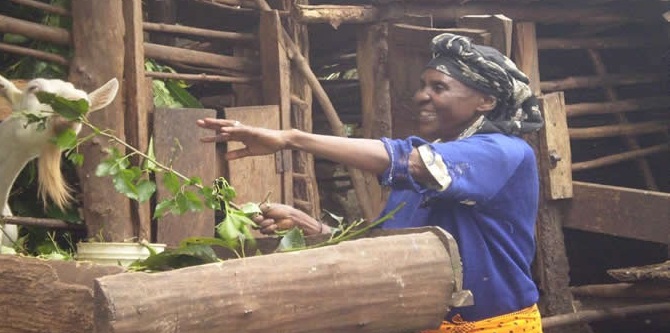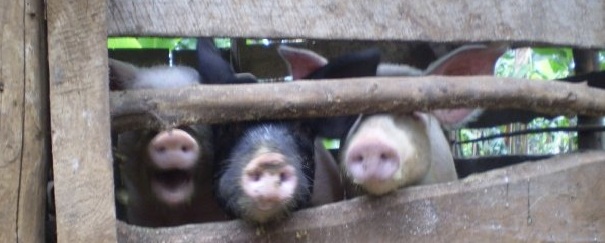
Since it's establishment in 1992, KEDA has funded numerous projects which have had a significant impact on the lives of local people. Here are a few examples of the individuals that KEDA has helped.
Case Study: Bee-Keeping |
|||
Mr. Ezekiel Njau received 6 hives from KEDA in 2004, and every two years since he has given 1 hive to a neighbour for them to start generating income from honey. In a good year, each hive can produce up to 20 litres of honey every 6 months. This can be sold for Tsh 5,000 per litre. However, the number of bees in the region has been decreasing due to increased use of pesticides. Currently only 3 hives are inhabited with bees and produce only 10-15 litres yearly. The variety of hives that are used are known as Kenyan Topbar hives which hang so that pests can not easily enter the hives, and the trees are painted with oil to stop pests reaching the hives. With KEDA's assistance Ezekiel has been able to send his children to school and throught to further education, and the extra income brought by the hives has allowed him to develop his own individual projects, such as dairy cows and pigs. |
Case Study: Dairy Goat Distribution |
|||
Mama Lina Temu Mama Lina got sick in 2004 with severe abdominal sores and became anaemic. KEDA gave a her a dairy goat which has dramatically increased her standard of living. Her goat has made it possible for her to buy medicines in times of illness by selling the milk and offspring. She sold the first kid and used the money to build a a new stable for her goats. She then gave the next two kids to her neighbours and sold the following two for Tsh 190,000. Her goat is currently pregnant again, and Mama Lina plans to spend the money from the kids on improving her goat's stable and her own house (which is starting to collapse). Her goat produces 4 litres of milk a day, 3 of which she drinks since the nutrients in the milk greatly help her abdominal ulcers. She sells the last litre to her neighbour who pays Tsh 9,000/ month. Without the goat, Mama Linu would have no available income with which to buy medicine to treat her illnesses, since her husband died many years ago. Mama Linu's goat also helps support three grandchildren and one daughter. Her daughter is employed by neighbours as a farmer and gets paid a low wage of Tsh 15,000/month. Mama Lina is constantly voices gratitude for KEDA's assistance. The contribution the goat has made to her quality of life is indisputable. Her grandson and goat were even published on Heifer's (one of KEDA's donors) calendar in 2006! “Without my goat I would be dead. She has provided with milk to help me keep my health and provide me with money, she has saved me!”
KEDA has proved many members of the community with goats, here a few stories from individuals:
Maria Mule Richard
Ester Carine Ester was given a milking goat, and also attended goat husbandry training, so that she knew how and when to worm her goat, provide the correct diet and diagnose symptoms. This ensured that the goat is healthy and able to breed. Her goat has had several kids which she has sold to help increase her families income. Ester has four children, all girls, all of whom she has been able to send to secondary school, even sending one to college. Without her milking goat, Ester would rely solely on her limited excess crops to provide extra income for her family. The goat's milk also helps Ester battle with her HIV, providing her with protein and nutrients her diet would otherwise lack.
Lucy Athanas Lyimo “Without the help from KEDA I would still be struggling, but the extra income gives me hope for my family’s future”.
|
Case Study: Pig Project |
|||
Dauson Mongi Dauson's family was the first family to benefit from KEDA's pig scheme. The Dauson family consists of four children and two parents who live on a very small farm with an income of less than $1 a day. They were given the pigs in 2005, which has helped the family enormously. They constructed a pig pen from local wood, and KEDA provided 14 days training on pig husbandry. The family were given 3 pigs which have all had between 3 and 8 piglets each. Each piglet has been sold when it reaches 3 months for Tsh 30,000, and 2 piglets were given to neighbours in hopes of continuing the scheme across the wider community. |
Case Study: Tree Nursery |
|||
Mr Ezekiel Njau lives with his family on 8 acres of organic farmland in the village Kilama Pofo, in the lower region of the Moshi rural district. The family subsist on their own crops, but to generate extra income Mr Njau also owns a tree nursery, as well as tending bees and dairy goats, all of which were provided or given assistance by KEDA. In return, Mr Njau assists KEDA by researching into plant propagation techniques, and experimenting on the abilities of different species of plant to grow in the region. Mr Njau grows a large variety of plants in his tree nursery such as oriental, fruit and timber trees, as well as flowers and local medicinal plants. He sells the trees to villagers for around Tsh 800-1000, depending on the species and the work that is needed for each the growth of particular species. Mr Njau would be able to sell the trees in large towns and cities for up to Tsh 5,000. However, he can not afford the transport costs.
Experimental Methods Mr Njau grows the trees and shrubs from seeds as well as cuttings and enjoys experimenting with new methods. He has great knowledge on the local plants and this project would not be possible without his time and enthusiasm. Some plants, such as the Ashok tree (which is an oriental tree) take between 3-4 months before germination begins. Other plants have a very complicated germination method, such as the Ficus benjanun, where the grower must first strip bark from an established small tree, then cover it in with wet soil / sawdust / algae and cover it with paper or polythene securely. Then this needs to be watered when dry, and after 7-8 days the branch will start shooting roots. The branch is cut above where the roots have sprouted and these are then planted in a separate polythene bag.
The 'School-Fees Tree' Agrocarpus is an exotic tree transplant from India which grows rapidly and will eventually (after around 15 years) reach approximately 40 foot. Mr Njau advises villagers to invest in one of these trees when they plan to have children, since they can be sold for timber when they are between 10-20 years old, when their heights may have reached up to 40 feet.
Additional Activities - Buck-Keeping
Mr Njau purchaseda female goat from KEDA, and is also the goat buck-keeper for the village. Villagers can hire the buck for mating purposes for Tsh 1,000 per session. However, the poorest families within the community who may not be able to afford the fee are offered the buck for free. Mr Njau's female goat produces 4 litres daily. Since he first bought his goat from KEDA in 2002, it has given birth to 6 kids. He has donated 3 of these kids to KEDA, who have then redistributed them to poor or disadvantaged members of the community. He has also sold another 3 kids to villagers for 70,000 Tsh.
With KEDA's help, Mr Njau has been able to send his children to school and further education and the extra income brought by KEDA's assistance has allowed him to develop his own personal projects, such as dairy cows and pigs. Mr Njau has in turn donated much time and research to KEDA, as well as redistributing goats, embodying many of KEDA's ideals - helping indivual families in the community, who then in turn may use their newfound knowledge or produce to give back to the community. |




 Lucy has one child of her own and lives with her extended family, meaning she is responsible for the provision of food for seven people. She owns a small area of land and found it hard to provide for the family. However, in 2007 Lucy was given a dairy goat by KEDA. This has allowed her to breed and sell the goat kids which gives her much needed extra income. She also sells half of the milk which her goat produces to a neighbour for an extra Tsh 6,000/month. KEDA has also provided Lucy with free ranging poultry, which produce eggs to help her feed her family.
Lucy has one child of her own and lives with her extended family, meaning she is responsible for the provision of food for seven people. She owns a small area of land and found it hard to provide for the family. However, in 2007 Lucy was given a dairy goat by KEDA. This has allowed her to breed and sell the goat kids which gives her much needed extra income. She also sells half of the milk which her goat produces to a neighbour for an extra Tsh 6,000/month. KEDA has also provided Lucy with free ranging poultry, which produce eggs to help her feed her family.
